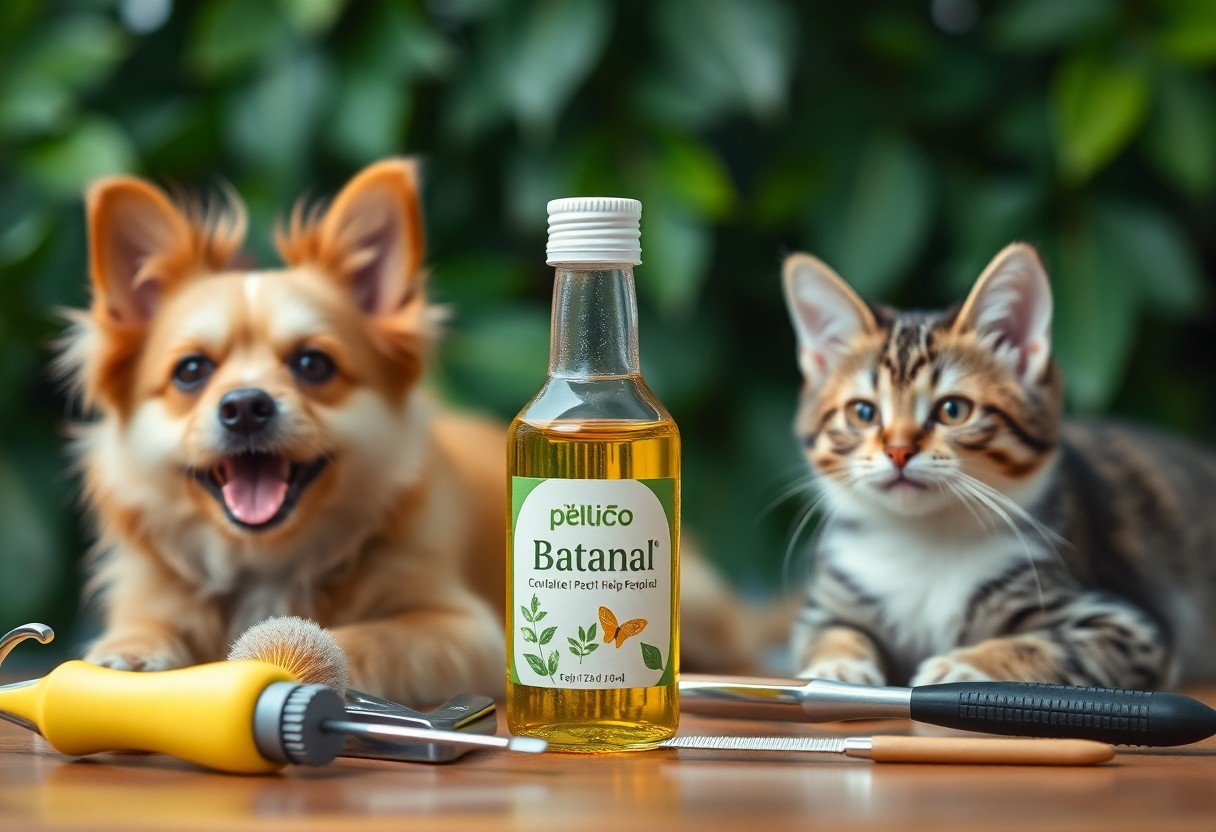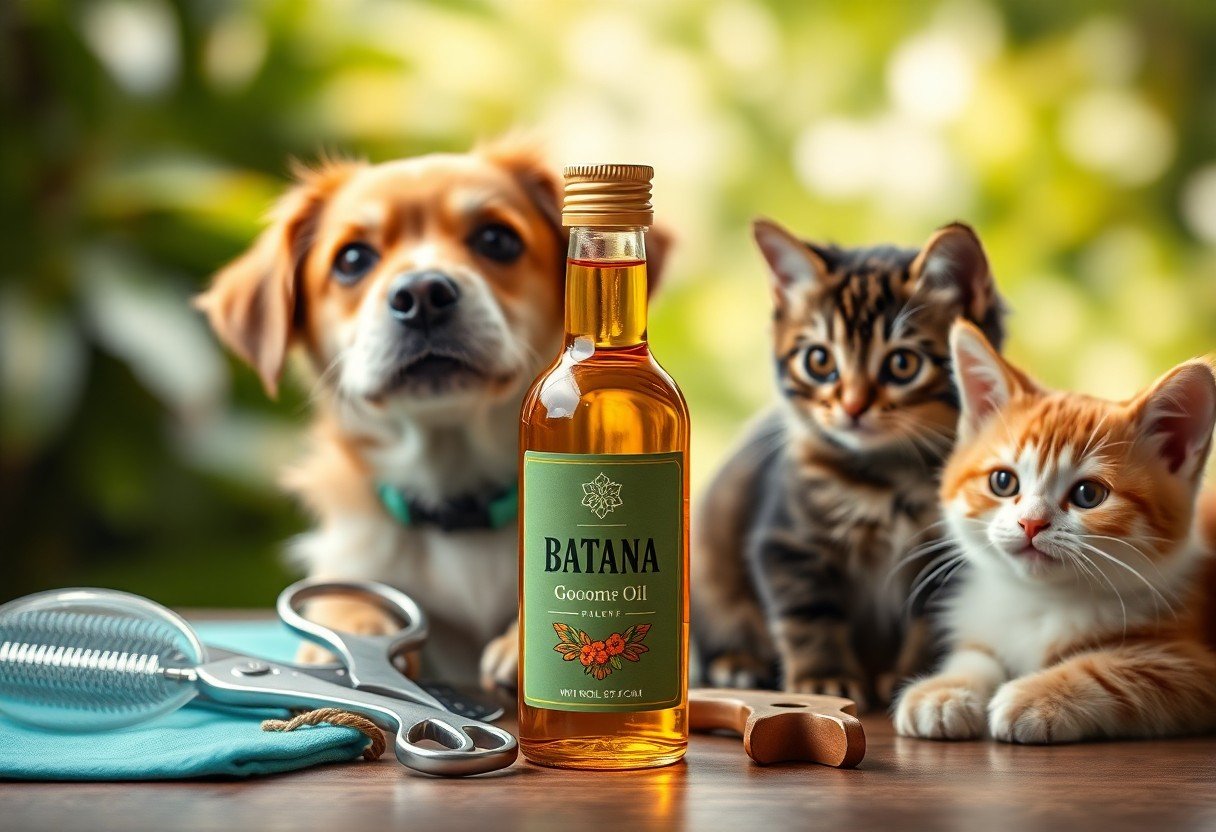Oil derived from the nuts of the American Palm tree, Batana oil is gaining popularity among pet owners for its numerous benefits. Rich in vitamins and fatty acids, it can enhance your pet’s coat health and support skin regeneration. However, it’s imperative to understand how to use it safely, as incorrect application could lead to adverse reactions. In this post, you’ll discover everything you need to know about Batana oil, from its advantages to best practices and potential risks, ensuring your furry friends receive the best care possible.
What is Batana Oil?
While Batana oil is an exceptional natural oil derived from the nuts of the American oil palm, it has garnered attention in recent years for its nourishing properties. Known for its rich fatty acid content, Batana oil promotes healthy skin and fur for your pets. It holds the power to moisturize, restore, and protect, making it a popular choice among pet owners who want to provide the best care for their furry friends.
Origin and Extraction Methods
Against the backdrop of Central America, Batana oil is traditionally crafted by indigenous communities utilizing time-honored techniques. The process involves hand-harvesting ripe oil palm nuts, followed by roasting and grinding them to extract the oil. This artisanal approach not only preserves the oil’s quality but also underscores its cultural significance.
Nutritional Composition
For health-conscious pet owners, the nutritional profile of Batana oil is impressive. Rich in omega fatty acids, it plays a vital role in maintaining your pet’s skin health and coat shine. Additionally, its antioxidant properties can strengthen the immune system and promote overall well-being.
Understanding the nutritional composition of Batana oil reveals its valuable components. The high concentration of oleic acid supports skin hydration and elasticity, while beneficial vitamins, such as A and E, work to combat oxidative stress in your pet. Coupled with its antimicrobial properties, Batana oil can play a significant role in preventing skin issues, ensuring your pet enjoys a vibrant, healthy life. Just ensure to use it appropriately, as overuse can lead to unwanted greasiness.

Benefits of Batana Oil for Pets
Some pet owners may be surprised to discover the numerous benefits of batana oil for your furry friends. This natural oil is rich in nutrients, promoting overall health and wellness in pets. From improving skin and coat to providing relief from inflammation, batana oil can be a remarkable addition to your pet care routine.
Skin and Coat Health
With its high content of fatty acids and vitamins, batana oil nourishes your pet’s skin and promotes a healthy, shiny coat. This oil not only hydrates the skin but also helps to alleviate dryness and irritation, making it an excellent choice for pets with sensitive skin or allergies.
Anti-inflammatory Properties
After a long day of play, your pet might experience joint discomfort or inflamed areas. Batana oil contains powerful anti-inflammatory properties that can help soothe these symptoms, ensuring that your pet stays comfortable and active.
Consequently, incorporating batana oil into your pet’s care can significantly lessen inflammation and promote healing. It can be especially beneficial for pets suffering from conditions such as arthritis or skin irritations. When used regularly, batana oil may help reduce the severity of inflammation, allowing your pet to maintain an active lifestyle. Always consult your veterinarian before starting any new treatment to ensure it’s safe and effective for your pet’s specific needs.
How to Use Batana Oil for Pets
The application of batana oil can enhance your pet’s wellness, whether it’s through topical applications or integrating it into their diet. Always prioritize quality and appropriate usage to ensure the best results for your furry companion.
Topical Applications
Before using batana oil topically on your pet, conduct a patch test on a small area of their skin to ensure there are no adverse reactions. If your pet suffers from dry skin or is prone to irritations, gently massage a few drops of diluted batana oil into the affected areas. This can help moisturize and promote healthy skin while providing a natural shine to their fur.
Incorporating into Diet
At mealtime, batana oil can be introduced into your pet’s diet to support their overall health. A few drops mixed with their regular food can stimulate appetite and enhance nutrient absorption.
Due to its rich nutrients, batana oil can be a beneficial addition to your pet’s diet. It is known for its high-fat content, which can promote a shiny coat, healthy skin, and improved digestion. However, be cautious not to over-supplement, as excessive intake may lead to digestive issues. Always consult your veterinarian before making any significant changes to ensure that batana oil is suitable for your pet’s specific dietary needs.
Potential Risks and Considerations
Many pet owners are drawn to Batana oil for its benefits, but it’s important to be aware of potential risks and considerations. Always consult with your veterinarian before introducing new products to your pet’s routine, especially if they have pre-existing conditions or are on medication. Be vigilant about observing your pet for any adverse reactions and adjust usage accordingly.
Allergies and Reactions
Above all, you should be aware that some pets may have allergies or sensitivities to Batana oil. It’s vital to perform a patch test before full application. Monitor your pet closely for any signs of irritation, such as excessive scratching or redness, and discontinue use if you notice any adverse effects.
Dosage Recommendations
Risks associated with incorrect dosages can lead to negative side effects for your pet. To avoid issues, start with a minimal amount, typically a few drops, and gradually increase it while monitoring your pet’s reaction. Always follow the guidance of your veterinarian, as they can tailor recommendations based on your pet’s specific needs and condition.
This careful approach ensures your pet receives the benefits of Batana oil without experiencing negative side effects. It’s important to strike the right balance, as excessive use can lead to potential gastrointestinal upset or skin irritation. Tracking your pet’s response will help you find the optimal dosage, allowing you to maximize the positive effects while keeping your furry friend safe.
Batana Oil vs. Other Oils
All pet owners should consider the benefits of Batana oil compared to other oils. This unique oil, derived from the nut of the American palm tree, is rich in nutrients like omega fatty acids, which can enhance your pet’s skin and coat health. Dr Sebi said Authentic Batana oil so we can grow our hair… highlighting its natural efficacy over conventional oils.
Comparative Benefits
Below is a summary of how Batana oil stacks up against some common oils:
| Oil Type | Benefits |
|---|---|
| Batana Oil | Excellent for hydration, reduces shedding, promotes healthy coat. |
| Coconut Oil | Good for skin moisture but may cause greasy residue. |
| Olive Oil | High in antioxidants, but can lead to weight gain in pets. |
Choosing the Right Oil for Your Pet
An vital consideration is understanding the specific needs of your pet when selecting an oil. Choosing an oil should align with your pet’s unique health status and coat type to ensure maximum effectiveness.
For instance, if you’re dealing with dry skin or a dull coat, Batana oil may be the best choice due to its intense moisturizing properties. However, avoid oils that can contribute to weight gain or sensitivity in pets, such as olive oil, particularly for those on a restricted diet. Always consult a veterinarian to ensure the best health practices for your pet.
Where to Buy Batana Oil
Once again, you have several options for purchasing Batana oil. Health and natural food stores often carry it, providing you with a chance to ask questions about the product. Additionally, many online retailers specialize in natural oils, allowing you to compare prices and read reviews. You might also find reputable beauty supply stores carrying this versatile oil. Be sure to check for quality to ensure you are getting a pure product that effectively benefits your pet.
Quality Indicators
Between the range of Batana oil products available, identifying quality can be a bit challenging. Look for oils that are organically sourced and cold-pressed to preserve nutrients. The packaging should also be opaque to protect the oil from light degradation. Transparency from the manufacturer regarding sourcing and processing methods is important, as this indicates a commitment to quality. Always check for certifications that ensure the product is pure, natural, and free from harmful additives.
Recommended Brands
For the best results, you should consider purchasing Batana oil from highly recommended brands known for their quality and ethical sourcing practices. Brands that prioritize organic farming and cold-press extraction methods typically offer products that meet your needs.
Understanding the importance of choosing the right brand cannot be understated. Focus on companies that provide detailed information about their sourcing and production processes. Avoid brands that do not disclose their ingredients or provide vague information, as this may indicate low-quality products. Instead, opt for those that emphasize natural, organic ingredients and transparent business practices. This way, you can be confident in the benefits you’re providing for your pet, ensuring they receive the best possible care.
To wrap up
From above, you now have a solid understanding of Batana oil and its numerous benefits for your pet’s health and coat. As you explore its capabilities, consider integrating this natural oil into your pet care routine to enhance hydration, promote a shiny coat, and support overall wellness. Always consult your veterinarian before making any changes to your pets’ grooming or treatment options. By doing so, you can ensure the safety and well-being of your furry companions while reaping the advantages of this powerful oil.
Q: What is Batana Oil and how is it beneficial for pets?
A: Batana Oil is a natural oil extracted from the nuts of the American palm tree, specifically found in the tropical regions of Central and South America. It is rich in fatty acids, vitamins, and antioxidants, which can help promote healthy skin and coat in pets. Regular use of Batana Oil can aid in moisturizing dry skin, alleviating irritation, and providing nourishment to damaged fur. Additionally, it may support overall coat shine and softness, making it a valuable addition to a pet’s grooming routine.
Q: How can Batana Oil be applied to my pet, and how often should it be used?
A: Batana Oil can be applied topically to your pet’s skin and fur. It is best to use a small amount, warming it slightly in your hands before massaging it into your pet’s coat, focusing on dry or irritated areas. For best results, Batana Oil can be used once a week as part of your grooming regimen. However, if your pet has specific skin conditions, consult your veterinarian for tailored advice on usage and frequency, ensuring the treatment aligns with your pet’s needs.
Q: Are there any side effects or precautions I should be aware of when using Batana Oil on my pet?
A: Batana Oil is generally safe for pets; however, it’s crucial to perform a patch test before full application. Apply a small amount of oil to a small area of your pet’s skin and monitor for any adverse reactions, such as itching or redness, over a 24-hour period. If any negative reactions occur, discontinue use and consult your veterinarian. Additionally, ensure that your pet does not ingest large amounts of oil, as it may lead to gastrointestinal upset. It’s advisable to use Batana Oil as part of a balanced grooming routine and not as a replacement for veterinary care when addressing skin conditions.

